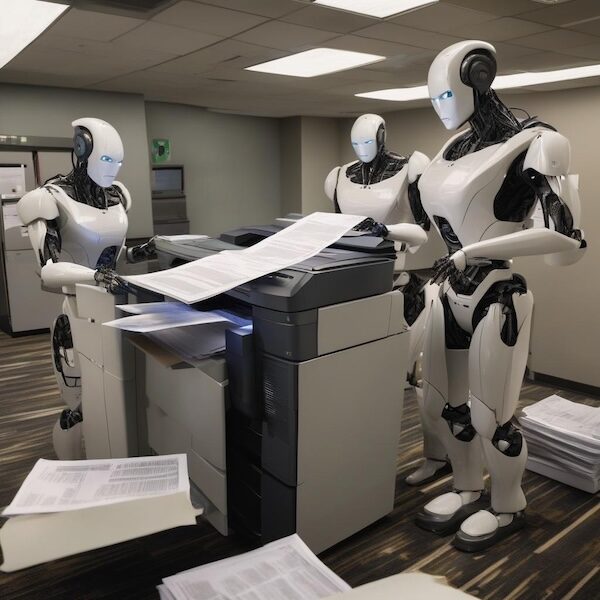AI
-
Summary execution
In one of our dog walking chats, Maren and I were talking about AI (I know, I know), and she was saying she didn’t really see the benefit of it in most circumstances. I was trying to be the AI pragmatist and responded that “it’s good for summarising documents”. To which Maren replied “but I don’t want that, I want to read the thing”. And Audrey has made a similar point in her newsletter pointing out that the summarised version of knowledge is “more efficient, to be sure. It’s also much, much safer.” The Apple Intelligence adverts you may have seen also make the ability to create quick summaries the main…
-
30+ Years of Ed Tech – 2024: AI Slop
Continuing my annual series of selecting one educational technology that became significant that year. I’ve covered AI in a few previous entries, but this year’s entry returns to it I’m afraid, and namely the rise of the term and the content it describes – AI slop. The term AI slop initially referred to that ridiculous artwork of Jesus and prawns (to be fair, these are weirdly quite funny), but can be broadened to encompass all AI generated content that is of low value. AI slop is a great term, although it’s not clear who came up with it. White supremacist Steve Bannon boasted of their policy of combat the media…
-
Behold the new wonder chemical
I’ve read a few historical science books recently, The Radium Girls, and The Chemical Age amongst them. One common factor when detailing the dangers of chemicals is the manner in which they were treated as a miracle cure, wonder drug, panacea for all ills. You shake your head in wonder at accounts of people drinking “radium water” to improve their health, or states deploying DDT with wild abandon. In all of these cases, initial positive results in some areas were extrapolated to be a cure-all. Part of the reason these chemicals went on to cause such damage is partly because people were making a lot of money and deliberately sought…
-
Openness isn’t just about product
David Wiley has been something of a mischievous imp recently, arguing that Open Education will become generative AI education. What I’ve always admired about David is his focus on pragmatism. This provides a valid and consistent lens (although not the only one) through which to engage with technology – essentially the overarching question is “is it useful for learners?” David argues that if we accept: I haven’t seen David’s actual talk yet as it wasn’t uploaded at the time of writing, so maybe he addresses some of what I say below [UPDATE – oh yes it is upoaded at https://www.youtube.com/watch?v=5brjbA6Yww4]. From a purely practical perspective, he is right. Regardless of…
-
Things I was wrong about pt 4 – AI
After admitting I was wrong about QR codes, the death of the VLE and the democratising power of social media, we’ve arrived at the inevitable one I suppose. I want you to insert the biggest sigh you can imagine here – <sigh>. This is an example of when some knowledge can be a bit disadvantageous. I have a PhD in Artificial Intelligence, from back in 1994 and I joined the OU as a lecturer in AI. So, yeah, I should know a bit about it. I was however, largely dismissive of it, partly because I was grounded in symbolic AI (expert systems and the like), and had not really monitored…
-
Privileging AI over people
Many of you will have seen that the Internet Archive lost an appeal against publishers recently. This related specifically to their National Emergency Library project when, during the pandemic, they removed the loaning cap on digital copies of books they had scanned. Remember, this was during the pandemic, when people couldn’t access physical copies, and many commercial publishers were effectively engaged in price gouging of digital copies. Access to some 500,000 books has been removed. I suppose I have some sympathy with authors who may be losing income as a result, and some of the digital-print analogies break down around copying a physical book and making it available to everyone,…
-
The darkish side of open licences
A few weeks ago Eamon Costello highlighted that Taylor and Francis/Routledge had sold the rights to harvest their content for Ai to Microsoft. I, like many others, felt a sense of outrage (although I haven’t published with them for quite a few years). I think it is the sense of powerlessness that is frustrating, they can do this, and make even more money from your content, without any consultation. However, I also reflected that as someone who ran an open access journal and publishes under open access licences, then Microsoft (and any other AI harvesters) could have been doing this happily already, without any need to consult me. I remember…
-
July 24 Round up
One month into leaving the OU, and I have been trying to establish some new pattern for the days. It’s been disrupted by parental care (or maybe that is the new pattern), and getting stuff sorted, but it’s beginning to settle down now. The most significant personal event this month has been my daughter’s graduation. She was part of that Covid cohort, who had it rough so it’s been a privilege to witness her growth as a scholar. I just need to persuade her to take up blogging now. As I mentioned last month, I’ve joined the Board of Trustees for the National Extension College, and it was great to…
-
The price of process
(Photo by Natalie Cardona on Unsplash) Like Maren, I read David Sax’s The Revenge of Analog last month, and some points in it chimed with some other thoughts I’d been having around AI. The book makes the case around how analogue industries and formats have revived despite their apparent inevitable demise in face of digital alternatives. It is sometimes too keen to reinforce its won hypothesis and ignores counter points (the education chapter had me wincing in places for over-simplification), but overall it marks an interesting reaction to technology. It can be viewed in some respects as an argument against technological determinism, that despite all of these predictions of doom,…
-
Don’t you want me? Questions to ask of new AI-VLEs
In my last post I was doing a backwards glance prompted by the Accenture-Udacity deal. In this one, I’ll look forwards. Apart from the MOOC angle, the other key aspect of the announcement was the investment in AI-enhanced learning environments. In terms of learning environments, the VLE/LMS has been the main player since around 2002. Prior to this there was a mixed economy, combining different commercial solutions, home spun set ups, open web tools. It was both a delightful cottage industry and something of a wild west. From the turn of the century the shift to an institutional wide, enterprise solution became inexorable until by the mid-2000s pretty much all…









